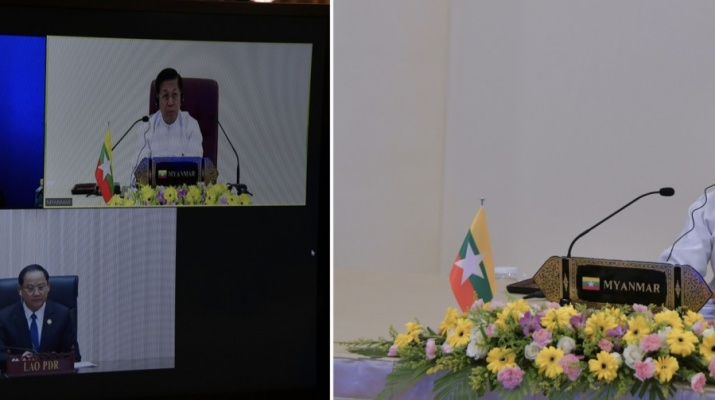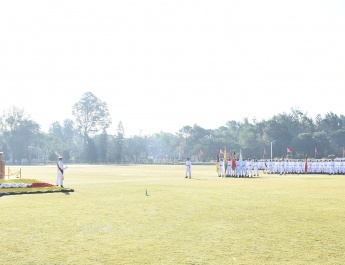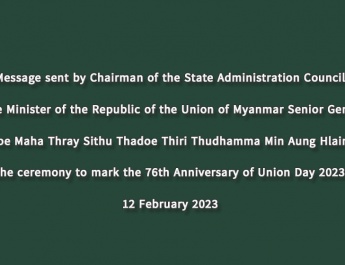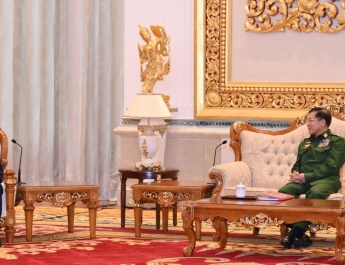NAY PYI TAW April 7
Chairman of the State Administration Council Prime Minister Senior General Min Aung Hlaing, Thai Prime Minister Prayut Chan-O-cha and Lao Prime Minister Sonexay Siphandone and officials held a tripartite coordination meeting on Transboundary smog issue among Myanmar, Thailand and Laos through video conferenc-ing this morning.
Discussions of Thai Prime Minister Prayut Chan-O-chaAt the meeting, the Thai Prime Minister expressed his firm belief that the meeting would solve the smog pollution issue through trust and understand-ing among them. The issue harmed social and economic sectors of the peoples from three countries. Hence, they all needed to join hands in solving the best solution and share information. Hence, the solving the problem was an effort for owned peoples.
An official from Pollution Control Department of the Thai Ministry of Natural Resources and Environment reported on impacts of Transboundary smog issue and potential for solving the issue through con-certed efforts of three countries.
Discussions of Laos Prime Minister Sonexay SiphandoneIn his discussions, the Lao Prime Minister said the air pollution is a common problem to be addressed by three countries. He highlighted that the Lao government has been implementing the plans to prevent air pollution and urging the people to participate in the sol-
ving the problems. Warning signboards have been posted at the forest fire sites and eff-orts are being made to prevent strending of forest fire. Likewise, preventive measures are being taken for necessary measures while climatic condition is being conducted under the survey.
Such measures are based on experiences of Myanmar and Thailand. In accord with the 2023-24 ASEAN Agreement on Transboundary Haze Pollution, Lao DPR has been implement-ing the plans as much as possible with the assistance of the international community. Moreover, Laos conducts the measuring the air pollution and shares information as well as preven-tion of forest fire. Any country needed to prevent forest fire and air pollution with the farsightedness. Laos follows the ASEAN Agreement on Transboundary Haze Pollution. Today’s meeting is the first for solving the air pollution problems the three countries are facing.
Discussions of Prime Minister Senior General Min Aung Hlaing of Republic of the Union of Myanmar The Senior General expressed his delightedness with the cha-
nce to deliver a speech on behalf ofthe government of the Republic of the Union of Myan-mar at the tripartite coordination meeting on Transboundary smog issue together with neigh-bours Thailand and Laos.
The Senior General thanked Thailand for holding the meet-ing to seek the ways for solving the latest Transboundary Haze Pollution problems. It is a problem among Thailand, Laos and Myanmar for several times. The forest fire which started in December 2022 has been worsening smog problems in GMS countries.
From 23 March 2023, the air transboundary haze pollution-happened in northern Thailand and southern Laos sharing border with eastern part of Myan-mar. During the period, forest fire accelerated in the eastern part of the nation due to high temperature. ASEAN Specia-lized Meteorological Centre
(ASMC) stated the density of smog triggered by forest fire slightly happened in eastern Myanmar on 1 April 2023 and it worsened in northern Thailand and southern Laos. On 2 April, such event slight occurred in eastern Myanmar and northern Thailand but worsened in southern Laos. On 3 April, smog density lessened but its density was high in southern Laos. On 4 April, high density of smog happened in eastern Myanmar, northern Thailand and southern Laos.
ASEAN Specialized Meteo-rological Centre (ASMC) predicted that the hot and dry climatic condition may cause in May this year in GMS countries, with high air pollution along borders. Hence, Myanmar will cooperate with regional countries in levering up the Transbo-undary Haze Pollution issues.
Currently, Myanmar is moni-toring data on fire hotspots received from ASMC and striv-ing for reducing the fire hotspot measures sent to regions and states, especially in Shan State sharing border with Thailand and Laos. In comparison with the areas of countries, some 56 of fire hotspots happened in 1,000 square metres of area in Myanmar in 2022, 171 in Lao and 11 in Thailand.
In March 2023, Myanmar faced 32 fire hotspots in 1,000 square metres of area, Laos 117 and Thailand nine. Myanmar places an emphasis on implementation of the Chaing Rai Action Plan 2017 in cooperation with regional countries so as to control Transboundary Haze Pollution. Myanmar is cooperating with GMS countries to reduce 20 percent of hotspot in 2022 as the Tenth Meeting of the Sub-Regional Ministerial Steering Committee on Transbo-undary Haze Pollution in the Mekong Sub-Region set 167,500 hotspots as basic factor. So, Myanmar faced 37,977 hotspots in 2022, reducing 33 percent rather than 2020 in comparison with 56,419 in 2020.
Myanmar has formed the national environmental conser-vation committee to reduce fire hotspots and control air pollution while implementing the action plans. In order to control forest fire and transboundary haze pollution, countries are imple-menting relevant action plans.
At present, Myanmar will en-hance cooperation measures in order to take information about fire based on ground condition, establish air quality survey de-vice and control transboundary haze pollution, forest fire and other kinds of fire.Hence, neighbouring countries are to join hands in controlling the transboundary haze pollution issue.The Senior General thanked Thailand for its cooperation in air quality management enhancement project of Myanmar to reduce content PM2.5 in the atmosphere.
The ASEAN has adopted the Roadmap on ASEAN Cooperation towards Transboundary Haze pollution Control. It is a strategic frame works for all ASEAN countries. Hence, cooperation in management and development for controlling the Transboundary Haze Pollution will be a key role in the future. Myanmar pledged to reduce potential number of hotspotsand conduct surveys on hotspots in line with the ASMC, take fire preventive measures, put out the fire and carry out rehabili-tation, raise the awareness for reduction of forest fire danger under monitoring and continu-ously cooperate with regional countries in transboundry haze pollution measures. This mee-ting will be completed success-fully, and it will help close cooperation among neighbouring countries in the future for having benefit of the region.
Further discussions of Thai Prime MinisterThen, the Thai Prime Minister took part in discussions, saying the issue is a natural disaster faced by the ASEAN region. Haze and air pollution caused by forest fires affects the health and other aspects of life of the people of the three countries and it is necessary to prevent such harmful effects. Myanmar, Thailand, Laos and Cambodia have hot seasons. To solve air pollution problems, organiza-tions at various levels have been formed and measures are being taken. Moreover, it is necessay to launch awareness-raising campaigns about buring farmland and wastes among the public.In taking necessary meas-ures, PM 2.5 concentration in the air must be addressed. It is impossible for a single coun-try to solve the issues of forest fires and burning and necessary equipment must be utili-zed. It is necessary for the coun-tries to cooperate at all levels.
As it is necessary to speed up conducting studies and cooperation about PM 2.5 concentration in the air, Thailand has accelerated the cooperation with Myanmar and Laos. Due to air pollution, the people have been suffering health and other issues. Thailand has been taking measure to reduce air pollution and is ready to exert utmost efforts to reduce air pollution. It is believed that our three countries will be able to step up cooperation with other ASEAN members to address the transnational air pollution.
It is necessary to take measures in accordance with Chiang Yai project. It is beneficial for the people to burn wastes to produce biogas on a small scale and cloth. In addressing air pollution, transnational air pollution can be addresses by enforcing laws and launching awareness-raising campaigns in respective countries and cooperation among the countries. Our countries are required to cooperate mutually to solve transnational air pollution and challenges must be overcome.
Greetings for Myanmar New Year Thingyan FestivalThen, the Thai Prime Minister extended greetings for the health and happiness of SAC Chairman Prime Minister Senior General Min Aung Hlaing and the people of Myan-mar during the festival and success of tasks being carr-ied out. Then the Thai Prime Minister extended greetings for the health and happiness of the Laotian Prime Minister and the people during the festival and success of tasks being carried out.Prime Minister of Republic of Union of Myanmar make additional suggestionsThen, the Senior General made additional suggestions, saying that the government of Myanmar has accepted the discussions of the Thai Prime Minister. Haze and air pollution issues faced by the three countries must be solved by the cooperation of the three coun-tries. I would like to make two proposals.
First, the majority of the people of Myanmar earn a living by carrying out agricul-tural activities. It is necessary to reduce hill-side cultivation in border areas of the three countries and in the same way to implement highland farming and take measures for fertilizer supplies. Second, the issue of waste material is huge, espe-cially in border areas. There-fore, it is necessary to discard waste materials properly and to utilize technologies. Myanmar has afreed to proposals made by the Thai Prime Minister for solving transnational air pollu-tion and vowed to cooperate. To solve the air pollution issues as soon as possible, the three countries are required to exert relentless efforts. Then, the Senior General extended gree-tings for the health and happiness of the two prime ministers and the two people during the New Year Festival before concluding the meeting.





